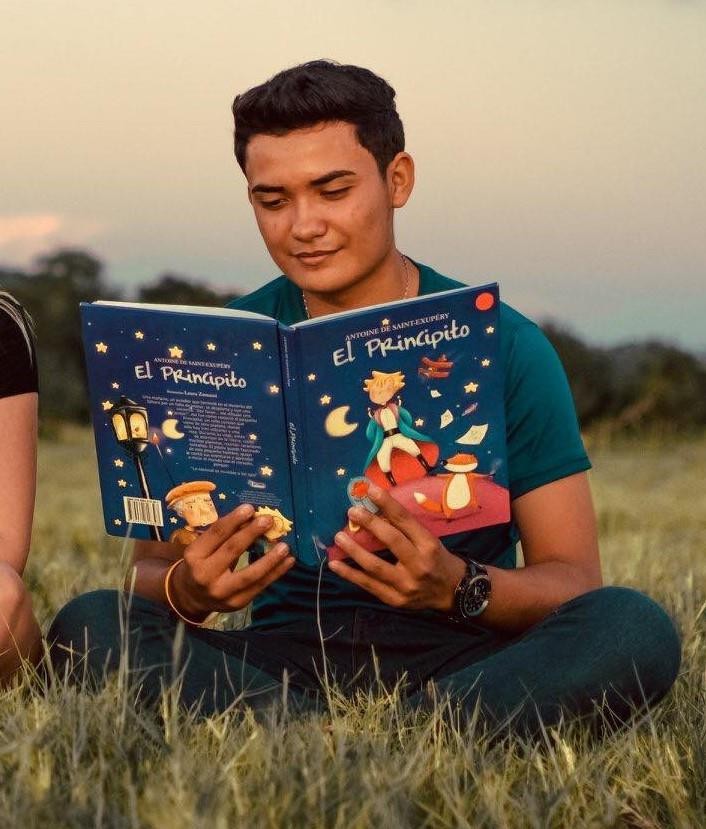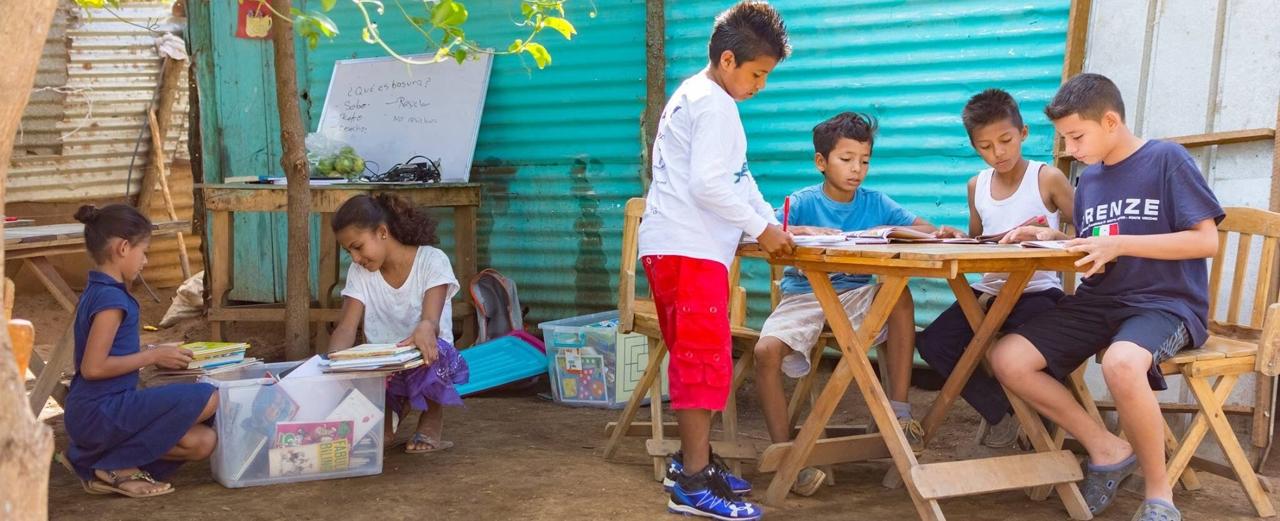 Never-ending stories with four-wheel-drive
Never-ending stories with four-wheel-drive
Books for children in rural areas of Nicaragua
The rustling of turning the pages, the smell of printer's ink on the paper, the hidden worlds behind countless letters - 8-year-old Juan loves it when the "Bibliobus" or Bookmobile, comes to his village because otherwise he and the other children in his village could hardly get their hands on a book. The farming families here cannot afford such luxury goods. In Juan's school, only the teacher has textbooks, from which he dictates the exercises to the children. However, for some months now, a library has been coming to his village once a week in the shape of a colourfully painted van full of exciting books. Juan is one of the most eager visitors of the library bus. Together with the other children, he meets there to read, do handicrafts and complete homework. He can borrow the books and continue reading them at home. Every week he looks forward to discovering new stories. They not only fuel his imagination, but they also hold untold opportunities for his future.
Necessity
Access to books and additional educational programmes for children in rural Nicaragua.
Activity
The Bookmobile and its staff provide access to books, teaching materials, workshops and courses for one day a week in a remote village.
Countable effort
Number of hours Nicaraguan children spend reading in the Bookmobile.
Result
The children routinely read and improve their performance at school.
Systemic effect
More rural children graduate from school and have the chance for social and economic advancement.
Background
Although 91.5 per cent of all children in Nicaragua attend primary school, less than half of them obtain a certificate (World Bank, 2019). There is great inequality in education in Nicaragua (UNDP, 2019): factors such as a weak educational infrastructure, low educational attainment and poverty in rural areas result in a strong gap between urban and rural areas. Children are particularly affected. The few schools in rural areas are poorly equipped, and children usually do not even have textbooks. With a daily income of less than one US dollar (GIZ, 2018), many parents cannot invest in their children’s education. The average schooling time of a village child in Nicaragua is two years below the already low national average of 6.8 years (Huelva et al., 2017; UNDP, 2019). By way of comparison, in Germany the expected duration of education is over 14 years.
In Nicaragua’s National Assessment Tests, rural children perform significantly worse than urban children. In particular, they lag when it comes to reading (Huelva et al., 2017; Laguna et al., 2008). Families in the rural parts of Nicaragua live predominantly from agriculture, and the adults themselves usually have a low level of education. For their children, this means that they will in all probability only attend primary school and have no prospects for well-paid jobs or even higher education – a development that is perpetuated generation after generation. It is precisely for this reason that it is essential to sensitise rural families to the benefits of reading on a regular basis.
The good deed
With your good deed, the Bookmobile brings important reading material to rural areas in Nicaragua and offers the children the opportunity to read regularly. Especially in places where state educational programmes are lacking, many children eagerly await the "Bibliobus". They develop their reading comprehension in a playful way, experience learning success and develop a reading routine. Qualified staff are on hand to support the children and promote their development through holistic, individually tailored educational programmes. For the children, reading means discovering new things, looking beyond their immediate situation and being able to benefit from educational opportunities. The commitment pays off: The Bookmobile contributes to an increase in the number of pupils graduating from school and thus provides the children with prospects for a better future.

AboutNicaragua
Managua
Capital
6.454.500
Number of inhabitants
4.790 $
Gross domestic product per capita per year
Placed 126th out of 189
Human Development Index
Nicaragua is particularly proud of its poets: the national hero Ruben Darío is considered the "Prince of the Spanish language".
About the organization and further information
Association
Puente Nica e.V.

Further information and source
- Andrew, A. et al., 2018. Impacts 2 years after a scalable early childhood development intervention to increase psychosocial stimulation in the home: A follow-up of a cluster randomised controlled trial in Colombia. PLoS medicine, 15(4), San Francisco.
- Conceição, P., 2019. Human Development Report 2019, Beyond income, beyond averages, beyond today: Inequalities in human development in the 21st century, UNDP, New York.
- DAAD, 2016. Bildungssystemanalyse: Daten & Analysen zum Hochschul- und Wissenschaftsstandort in Nicaragua, Bonn.
- Deutsche Gesellschaft für Internationale Zusammenarbeit (GIZ), 2018. Nicaragua – soziale Entwicklung, Bonn/Eschborn.
- Filmer, D. et al., 2018. Learning to Realize Education’s Promise, World Development Report, The World Bank, Washington, D.C.
- Huelva, L. et al., 2017. La calidad de la educación en Nicaragua – ¿Goza la niñez de las mismas oportunidades?, Fundación nicaragüense para el desarrollo económico y social, Managua.
- Terres des femmes, 2020. Nicaragua Landesüberblick, Berlin.
- Woessmann, L., 2003. Schooling resources, educational institutions, and student performance: The international evidence, Oxford B. Econ. Stat. 65 (2), Hoboken.
- Woessmann, L., 2004. How Equal are Educational Opportunities? Family Background and Student Achievement in Europe and the US, CESifo Working Paper Series No. 1162, München.




